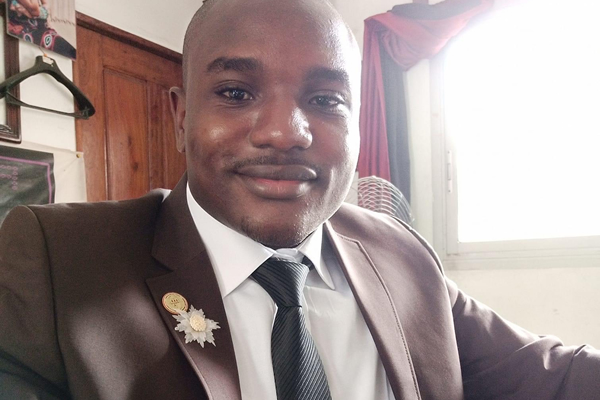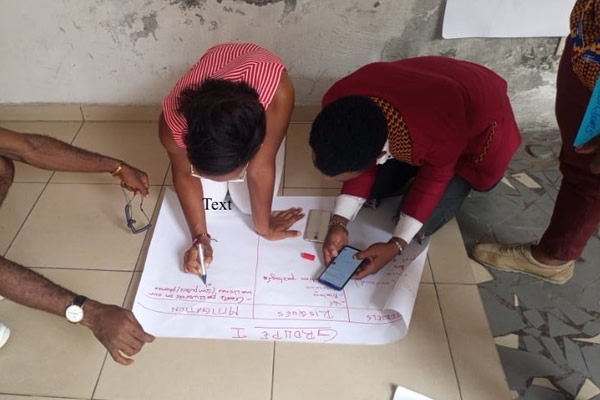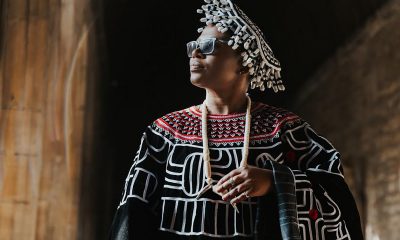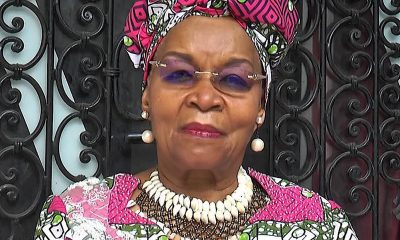World
Cameroon group works to protect, empower LGBTQ community
Working For Our Wellbeing operates throughout country

Nkwain Hamlet is the president and executive director of of Working For Our Wellbeing, an LGBTQ advocacy organization in Douala, Cameroon’s bustling economic capital, that works toward providing queer Cameroonians with access to safety and a chance to live confident, fully self-actualized lives in a society that is nothing but vilely queerphobic. Hamlet recently spoke with the Washington Blade about his LGBTQ advocacy and future representation in the country’s government.
“Cameroon, at all stages, is in a transition point. Whether it’s the presidency, ministerial roles, or different members of parliament, or even the Senate. We even have one of the oldest members of parliament in Africa,” he says about the possibility of an LGBTQ politician emerging in the country. “So, I think that in upcoming years, it will be a moment!”
Pushing Cameroon towards acceptance
Cameroon, like many African countries, has a culture of queerphobia that colonialism brought. Before Germany, and later France and the U.K, seized Cameroonian land and resources — wiping away any sense of freedom, agency and culture that existed in opposition to eurocentrism — queerness in what is now Cameroon was the norm.
Native Cameroonians practiced homoeroticism, with men being allowed to have consensual sex with other men. Women could also marry other women and establish same-sex households.
“Among the Pangwe people of present-day Cameroon and Gabon, homosexual intercourse was practiced between males of all ages,” reports Bernadine Evaristo for The Guardian.
Nankiti Nofuru for the Global Press Journal also reports about the Balong ethnic group.
“The Balong tradition allows women to marry to other women in cases where women are barren or have no children. Even women who want additional children but are unable to conceive them may marry other women,” reported Nofaru
So, for Hamlet, whose goal is to advocate for all queer people in Cameroon by affording them the space to confidently inhabit their queerness, one of his organization’s focal points is to participate in politics and make queerness a national conversation that will encourage the government to establish wholly-protected human rights for LGBTQ individuals.
“We currently don’t have any representation at the parliamentary level,” says Hamlet. “And because of this, we want to make sure that [LGBTQ people] are reflected and have role models in [this country’s] political positions.”
Cameroon’s future elections are on Hamlet’s mind, and he has famliarized himself with conversations surrounding the necessity to make sure that queer people are not only acknowledged in politics, but involved in decision-making processes. He emphasizes that there is a need for someone queer to step out, penetrate the politics scene and engage with the government.
Carrying this out, however, does not come without its hindrances. Hamlet recognizes one has to negotiate two realities in order to be a successful out LGBTQ politician in a predominantly queerphobic Cameroon.
“[To be a politician], you have to come out and embrace the political question of who is for you and who isn’t. And also, you have to think about who will support your candidacy and political agenda financially,” says Hamlet.
He notes that financial support can exist through entrepreneurs and other influential figures who support the LGBTQ movement. Attaining it can nevertheless be exacting as many of them fear the public backlash that ensues after standing in favor of what Cameroonian nationals consider controversial identity issues.
“[Entrepreneurs] may not want to give their position regarding identity issues, and because of the backlash, you see them deleting their messages whether on Twitter or Facebook. So, you just have to identify who these people are and know that they’re open-minded and [will work in your favor],” says Hamlet.

Making sure no one is left behind
Cameroon for years has been embroiled in the Anglophone Crisis, a civil war that stems from a conflict between Anglophone and Francophone Cameroonians, and their fight to maintain their respective colonial legacies, especially with regards to law and education.
BBC reports eight out of Cameroon’s 10 semi-autonomous administrative regions are Francophone, while the other two are Anglophone. English-speaking Cameroonians consequently face discrmination because they are excluded from lucrative employment opportunities and a chance at significant political representation as “government documents are often only published in French, even though English is also an official language.” Cameroon’s education system is also Francophone-centric, and it has created disparities because English-speaking areas are subjected to French standards, even though they inherited the British education system.
Reuters reports the Anglophone Crisis as recently as 2020 has killed approximately 3,500 people. The violence has displaced 700,000 people from their homes as English-speaking groups fight to break away from the predominantly French-speaking government.
The crisis has quickly become an LGBTQ human rights issue for Hamlet and Working For Our Wellbeing because a queer population exists in the two Anglophone regions: Northwest and Southwest. Hamlet describes the situation as “catastrophic” when speaking about how the conflict has affected his organization’s work.
“A lot of the work we do involves educating heterosexual people in the Francophone zones on tolerance and acceptance. Now that this conflict exists, our work becomes challenging because we are not able to reach the Anglophone zones as effectively as we are able to reach the Francophone zones,” says Hamlet.
He also notes LGBTQ people in the area are “in a death trap.” It therefore feels to him when he tackles national advocacy work that there is a gap because his organization is unable to reach Anglophone LGBTQ individuals without encountering diffculties.
Working For Our Wellbeing is nevertheless redefining their strategies to better equip themselves to reach out to LGBTQ Cameroonians in the country’s English-speaking areas. Part of this includes the development of a stringent security plan and analyzing the day-to-day situation to ensure that Anglophone LGBTQ individuals can be fiercely advocated for without the organization facing any repercussions. The aftermath of the COVID-19 pandemic and Cameroon’s general political crisis have made it imperative to advocate on behalf queer Anglophones with the utmost care and sensitivity.
Imparting hope and joy to the LGBTQ community
As this month nears the end and many countries around the world conclude their Pride celebrations, Working For Our Wellbeing’s festivities are in full force, with preparations for a poetry competition fully underway. There will also be a round-table conversation that will welcome open-minded members of the general public interested in discussing and learning more about LGBTQ issues in Cameroon.
“We’ve been hit hard by the law, and with everything, so we want to celebrate ourselves,” says Hamlet. “We are ready.”
Working For Our Wellbeing after Pride will continue to do what it knows best: Caring for LGBTQ Cameroonians. Whether it’s providing temporary shelter for queer people who have been rejected by their families or empowering them to be financially independent, one thing that is certain is that Hamlet and his organization will put LGBTQ Cameroonians first, normalize queerness and establish a culture akin to that which existed pre-colonialism.
Books
New book profiles LGBTQ Ukrainians, documents war experiences
Tuesday marks four years since Russia attacked Ukraine

Journalist J. Lester Feder’s new book profiles LGBTQ Ukrainians and their experiences during Russia’s war against their country.
Feder for “The Queer Face of War: Portraits and Stories from Ukraine” interviewed and photographed LGBTQ Ukrainians in Kyiv, the country’s capital, and in other cities. They include Olena Hloba, the co-founder of Tergo, a support group for parents and friends of LGBTQ Ukrainians, who fled her home in the Kyiv suburb of Bucha shortly after Russia launched its war on Feb. 24, 2022.
Russian soldiers killed civilians as they withdrew from Bucha. Videos and photographs that emerged from the Kyiv suburb showed dead bodies with their hands tied behind their back and other signs of torture.

Olena Shevchenko, chair of Insight, a Ukrainian LGBTQ rights group, wrote the book’s forward.

The book also profiles Viktor Pylypenko, a gay man who the Ukrainian military assigned to the 72nd Mechanized Black Cossack Brigade after the war began. Feder writes Pylypenko’s unit “was deployed to some of the fiercest and most important battles of the war.”
“The brigade was pivotal to beating Russian forces back from Kyiv in their initial attempt to take the capital, helping them liberate territory near Kharkiv and defending the front lines in Donbas,” wrote Feder.
Pylypenko spent two years fighting “on Ukraine’s most dangerous battlefields, serving primarily as a medic.”
“At times he felt he was living in a horror movie, watching tank shells tear his fellow soldiers apart before his eyes,” wrote Feder. “He held many men as they took their final breaths. Of the roughly one hundred who entered the unit with him, only six remained when he was discharged in 2024. He didn’t leave by choice: he went home to take care of his father, who had suffered a stroke.”
Feder notes one of Pylypenko’s former commanders attacked him online when he came out. Pylypenko said another commander defended him.
Feder also profiled Diana and Oleksii Polukhin, two residents of Kherson, a port city in southern Ukraine that is near the mouth of the Dnieper River.
Ukrainian forces regained control of Kherson in November 2022, nine months after Russia occupied it.
Diana, a cigarette vender, and Polukhin told Feder that Russian forces demanded they disclose the names of other LGBTQ Ukrainians in Kherson. Russian forces also tortured Diana and Polukhin while in their custody.
Polukhim is the first LGBTQ victim of Russian persecution to report their case to Ukrainian prosecutors.

Feder, who is of Ukrainian descent, first visited Ukraine in 2013 when he wrote for BuzzFeed.
He was Outright International’s Senior Fellow for Emergency Research from 2021-2023. Feder last traveled to Ukraine in December 2024.
Feder spoke about his book at Politics and Prose at the Wharf in Southwest D.C. on Feb. 6. The Washington Blade spoke with Feder on Feb. 20.
Feder told the Blade he began to work on the book when he was at Outright International and working with humanitarian groups on how to better serve LGBTQ Ukrainians. Feder said military service requirements, a lack of access to hormone therapy and documents that accurately reflect a person’s gender identity and LGBTQ-friendly shelters are among the myriad challenges that LGBTQ Ukrainians have faced since the war began.
“All of these were components of a queer experience of war that was not well documented, and we had never seen in one place, especially with photos,” he told the Blade. “I felt really called to do that, not only because of what was happening in Ukraine, but also as a way to bring to the surface issues that we’d had seen in Iraq and Syria and Afghanistan.”

Feder also spoke with the Blade about the war’s geopolitical implications.
Russian President Vladimir Putin in 2013 signed a law that bans the “promotion of homosexuality” to minors.
The 2014 Winter Olympics took place in Sochi, a Russian resort city on the Black Sea. Russia annexed Crimea from Ukraine a few weeks after the games ended.
Russia’s anti-LGBTQ crackdown has continued over the last decade.
The Russian Supreme Court in 2023 ruled the “international LGBT movement” is an extremist organization and banned it. The Russian Justice Ministry last month designated ILGA World, a global LGBTQ and intersex rights group, as an “undesirable” organization.
Ukraine, meanwhile, has sought to align itself with Europe.
Ukrainian President Volodymyr Zelenskyy after a 2021 meeting with then-President Joe Biden at the White House said his country would continue to fight discrimination based on sexual orientation and gender identity. (Zelenskyy’s relationship with the U.S. has grown more tense since the Trump-Vance administration took office.) Zelenskyy in 2022 publicly backed civil partnerships for same-sex couples.
Then-Ukrainian Ambassador to the U.S. Oksana Markarova in 2023 applauded Kyiv Pride and other LGBTQ and intersex rights groups in her country when she spoke at a photo exhibit at Ukraine House in D.C. that highlighted LGBTQ and intersex soldiers. Then-Kyiv Pride Executive Director Lenny Emson, who Feder profiles in his book, was among those who attended the event.
“Thank you for everything you do in Kyiv, and thank you for everything that you do in order to fight the discrimination that still is somewhere in Ukraine,” said Markarova. “Not everything is perfect yet, but you know, I think we are moving in the right direction. And we together will not only fight the external enemy, but also will see equality.”
Feder in response to the Blade’s question about why he decided to write his book said he “didn’t feel” the “significance of Russia’s war against Ukraine” for LGBTQ people around the world “was fully understood.”
“This was an opportunity to tell that big story,” he said.
“The crackdown on LGBT rights inside Russia was essentially a laboratory for a strategy of attacking democratic values by attacking queer rights and it was one as Ukraine was getting closet to Europe back in 2013, 2014,” he added. “It was a strategy they were using as part of their foreign policy, and it was one they were using not only in Ukraine over the past decade, but around the world.”
Feder said Republicans are using “that same strategy to attack queer people, to attack democracy itself.”
“I felt like it was important that Americans understand that history,” he said.
Netherlands
Rob Jetten becomes first gay Dutch prime minister
38-year-old head of government sworn in on Monday

Rob Jetten on Monday became the Netherland’s first openly gay prime minister.
Jetten’s centrist D66 party won the country’s elections last October, narrowly defeating Geert Wilders’ far-right Party for Freedom.
King Willem-Alexander on Monday swore in Jetten, who is also the country’s youngest-ever prime minister. The Associated Press notes Jetten’s coalition government includes the center-right Christian Democrats and the center-right People’s Party for Freedom and Democracy.
“Proud to be able to do this together,” said Jetten in an X post before Willem-Alexander swore him in.
COC Nederland, a Dutch LGBTQ advocacy group, in a statement said Jetten “becoming prime minister shows that your sexual orientation doesn’t have to matter.”
“You can become a construction worker, a doctor, a lawyer, and even prime minister,” said COC Nederland.
The advocacy group noted Jetten has said his government will implement its “Rainbow Agreement” that include calls for strengthening nondiscrimination laws “to better protect transgender and intersex people,” appointing more “discrimination investigators … to address violence against LGBTQ+ people and other minorities,” and introducing measures “to promote acceptance in schools.”
“COC will hold the Cabinet to that promise,” said COC Nederland.
Jetten’s fiancé is Nicolás Keenen, an Argentine field hockey player who competed in the 2024 Summer Olympics in Paris.
Jetten is one of two openly gay heads of government: Andorran Prime Minister Xavier Espot Zamora came out in 2023. Gay Latvian President Edgars Rinkēvičs, who is the country’s head of state, took office in 2023.
Leo Varadkar, who was Ireland’s prime minister from 2017-2020 and from 2022-2024, and Xavier Bettel, who was Luxembourg’s prime minister from 2013-2023, are gay. Ana Brnabić, who was Serbia’s prime minister from 2017-2024, is a lesbian.
Former Icelandic Prime Minister Jóhanna Sigurðardóttir in 2009 became the world’s first openly lesbian head of government. Former Belgian Prime Minister Elio Di Rupo, former San Marino Captain Regent Paolo Rondelli, and former French Prime Minister Gabriel Attal are also openly gay.
Colombian presidential candidate Claudia López, who is the former mayor of Bogotá, the Colombian capital, would become her country’s first female and first lesbian president if she wins the country’s presidential election that is taking place later this year.
Ecuador
Justicia reconoce delito de odio en caso de bullying en Instituto Nacional Mejía de Ecuador
Johana B se suicidó el 11 de abril de 2023

A casi tres años del suicidio de Johana B., quien estudió en el Instituto Nacional Mejía, colegio emblemático de Quito, el Tribunal de la Corte Nacional de Justicia ratificó la condena para el alumno responsable del acoso escolar que la llevó a quitarse la vida.
Según información de la Fiscalía, el fallo de última instancia deja en firme la condena de cuatro años de internamiento en un centro para adolescentes infractores, en una audiencia de casación pedida por la defensa del agresor, tres meses antes de que prescriba el caso.
Con la sentencia, este caso es uno de los primeros en el país en reconocer actos de odio por violencia de género, delito tipificado en el artículo 177 del Código Orgánico Penal Integral (COIP).
El suicidio de Johana B. ocurrió el 11 abril de 2023 y fue consecuencia del acoso escolar por estereotipos de género que enfrentó la estudiante por parte de su agresor, quien constantemente la insultaba y agredía por su forma de vestir, llevar el cabello corto o practicar actividades que hace años se consideraban exclusivamente para hombres, como ser mando de la Banda de Paz en el Instituto Nacional Mejía.
Desde la muerte de Johana, su familia buscaba justicia. Su padre, José, en una entrevista concedida a edición cientonce para la investigación periodística Los suicidios que quedan en el clóset a causa de la omisión estatal afirmó que su hija era acosada por su compañero y otres estudiantes con apodos como “marimacha”, lo que también fue corroborado en los testimonios recogidos por la Unidad de Justicia Juvenil No. 4 de la Fiscalía.
Los resultados de la autopsia psicológica y del examen antropológico realizados tras la muerte de Johana confirmaron las versiones de sus compañeras y docentes: que su agresor la acosó de manera sistemática durante dos años. Los empujones, jalones de cabello o burlas, incluso por su situación económica, eran constantes en el aula de clase.
La violencia que recibió Johana escaló cuando su compañero le dio un codazo en la espalda ocasionándole una lesión que le imposibilitó caminar y asistir a clases.
Días después del hecho, la adolescente se quitó la vida en su casa, tras escuchar que la madre del agresor se negó a pagar la mitad del valor de una tomografía para determinar la lesión en su espalda, tal como lo había acordado previamente con sus padres y frente al personal del DECE (Departamento de Consejería Estudiantil del colegio), según versiones de su familia y la Fiscalía.
#AFONDO | Johana se suicidó el 11 de abril de 2023, tras ser víctima de acoso escolar por no cumplir con estereotipos femeninos 😢.
Dos semanas antes, uno de sus compañeros le dio un codazo en la espalda, ocasionándole una lesión que le imposibilitó caminar 🧵 pic.twitter.com/bXKUs9YYOm
— EdicionCientonce (@EdCientonce) September 3, 2025
“Era una chica linda, fuerte, alegre. Siempre nos llevamos muy bien, hemos compartido todo. Nos dejó muchos recuerdos y todos nos sentimos tristes; siempre estamos pensando en ella. Es un vacío tan grande aquí, en este lugar”, expresó José a Edición Cientonce el año pasado.
Para la fiscal del caso y de la Unidad de Justicia Juvenil de la Fiscalía, Martha Reino, el suicidio de la adolescente fue un agravante que se contempló durante la audiencia de juzgamiento de marzo de 2024, según explicó a este medio el año pasado. Desde entonces, la familia del agresor presentó un recurso de casación en la Corte Nacional de Justicia, que provocó la dilatación del proceso.
En el fallo de última instancia, el Tribunal también dispuso que el agresor pague $3.000 a la familia de Johana B. como reparación integral. Además, el adolescente deberá recibir medidas socioeducativas, de acuerdo al artículo 385 del Código Orgánico de la Niñez y Adolescencia, señala la Fiscalía.
El caso de Johana también destapó las omisiones y negligencias del personal del DECE y docentes del Instituto Nacional Mejía. En la etapa de instrucción fiscal se comprobó que no se aplicaron los protocolos respectivos para proteger a la víctima.
De hecho, la Fiscalía conoció el caso a raíz de la denuncia que presentó su padre, José, y no por el DECE, aseguró la fiscal el año pasado a Edición Cientonce.
Pese a estas omisiones presentadas en el proceso, el fallo de última instancia sólo ratificó la condena para el estudiante.




















